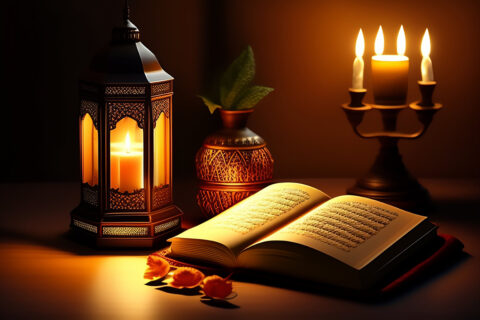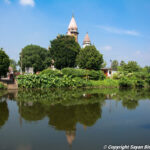Mirza Ghalib (1797–1869) was one of the most prominent poets of the Urdu and Persian languages. Born as Mirza Asadullah Baig Khan in Agra, India, he is best known for his profound and philosophical ghazals that explore themes of love, loss, and existential longing. Ghalib lived during a time of significant upheaval in India, particularly during the decline of the Mughal Empire and the rise of British colonial power. His poetry reflects this turbulent period, both in his personal struggles and in the larger historical context.
Key Themes in Ghalib’s Poetry:
Love and Longing: Ghalib’s ghazals often delve into the complexities of love—both spiritual and earthly. His work reflects an unfulfilled, sometimes melancholic love, which has become a hallmark of his style.
Philosophy and Existentialism: He pondered deeply about life, fate, and the human condition. His verse frequently engages with questions about the meaning of existence and the nature of human suffering.
Spirituality and Sufism: While Ghalib wasn’t a strict practitioner of religious rituals, his poetry is imbued with a Sufi-like mysticism. He explores the relationship between the lover and the beloved, often hinting at a divine connection.
Satire and Wit: Ghalib was also known for his wit and humor. He used satire to comment on societal norms, hypocrisy, and the changes brought about by colonialism and political decline.
Legacy:
Mirza Ghalib’s influence on Urdu literature is immeasurable. His ghazals continue to be recited, sung, and appreciated by lovers of poetry. Even after over 150 years, his work remains relevant and deeply moving. Ghalib’s contributions helped shape the modern form of the Urdu ghazal, and his literary genius is celebrated both in India and Pakistan.
Ghalib’s love poetry is often characterized by its intensity, melancholy, and a sense of unfulfillment. He frequently expresses a longing for a beloved who is either absent or unattainable. This longing can be interpreted as a metaphor for the human soul’s yearning for a higher spiritual connection or for the elusive nature of love itself.
Key themes in Ghalib’s love poetry include:
Unrequited Love: Ghalib often writes about the pain of unrequited love, where his affections are not reciprocated. This theme is a common one in classical Urdu poetry, but Ghalib’s treatment of it is particularly poignant and introspective.
Separation and Absence: The absence of the beloved is a recurring motif in Ghalib’s poetry. He describes the anguish of separation and the longing for reunion.
The Beloved as Divine: Ghalib frequently employs Sufi imagery to portray the beloved as a divine or spiritual entity. This suggests a spiritual dimension to his love, beyond the earthly realm.
The Paradox of Love: Ghalib explores the contradictory nature of love, highlighting its both joy and pain. He suggests that love can be a source of both ecstasy and suffering.
Let’s explore one of Ghalib’s most famous ghazals.
Ghazal:
Aaj nahin to kabhi na ayega daur-e-vaslAaj nahin to kabhi na ayega daur-e-vaslHum bhi nahin rahenge, tum bhi nahin rahogeAaj nahin to kabhi nahin ayega daur-e-vasl
Translation:
If not today, then never will the season of union come.If not today, then never will the season of union come.Neither I will remain, nor you will remain.If not today, then never will the season of union come.
Analysis:
This ghazal beautifully encapsulates the fleeting nature of time and the impermanence of human life. Ghalib emphasizes the urgency of seizing the moment, as opportunities for union or happiness may never come again. The lines “Neither I will remain, nor you will remain” underscore the inevitable end of all earthly existence.
The ghazal’s refrain, “If not today, then never will the season of union come,” creates a sense of urgency and longing. It suggests that the moment of union is precious and fleeting, and that one should not let it pass without cherishing it.
Ghalib was a deep thinker who often pondered the meaning of life, fate, and the human condition. His poetry is filled with philosophical questions and reflections. Some of the key themes he explored include:
The Inevitability of Death: Ghalib was keenly aware of the inevitability of death. He often reflected on the transience of life and the futility of human pursuits in the face of mortality.
The Nature of Fate: Ghalib grappled with the concept of fate and its role in human life. He questioned whether human actions are truly free or predetermined by fate.
The Meaning of Existence: Ghalib often pondered the meaning of life and the purpose of human existence. He explored the idea that life may be a journey of self-discovery and spiritual growth.
The Paradox of Human Experience: Ghalib recognized the contradictions and paradoxes inherent in human experience. He explored the tension between joy and sorrow, hope and despair, and love and loss.
Ghazal:
Naadir-e-zamane hue hain, magar kya faidaNaadir-e-zamane hue hain, magar kya faidaHum bhi nahin rahenge, tum bhi nahin rahogeNaadir-e-zamane hue hain, magar kya faida
Translation:
We have become the rarest of the rare, but what is the benefit?We have become the rarest of the rare, but what is the benefit?Neither I will remain, nor you will remain.We have become the rarest of the rare, but what is the benefit?
Analysis:
In this ghazal, Ghalib reflects on the futility of worldly achievements and accomplishments. He suggests that even if one becomes the rarest of the rare, it ultimately does not matter, as death will inevitably claim everyone. The lines “Neither I will remain, nor you will remain” underscore the impermanence of human life and the futility of striving for earthly glory.
This ghazal is a powerful reminder of the fleeting nature of life and the importance of focusing on what truly matters, such as spiritual growth and human connection.
Mirza Ghalib is widely considered one of the most influential poets of the Urdu language. His work has had a profound impact on subsequent generations of Urdu poets. Some of the key ways in which Ghalib influenced Urdu literature include:
The Modern Urdu Ghazal: Ghalib’s ghazals helped to shape the modern form of the Urdu ghazal. He introduced new themes, techniques, and styles that have become hallmarks of the genre.
The Exploration of Emotions: Ghalib’s poetry explored a wide range of emotions, from love and longing to despair and disillusionment. This emotional depth and complexity have inspired countless other Urdu poets.
The Use of Language: Ghalib was a master of the Urdu language, and his poetry is renowned for its beauty, elegance, and precision. His innovative use of language and imagery has influenced countless other Urdu poets.
The Fusion of Persian and Urdu: Ghalib’s poetry often blended elements of Persian and Urdu, creating a unique and distinctive style. This fusion has had a significant impact on the development of Urdu literature.



